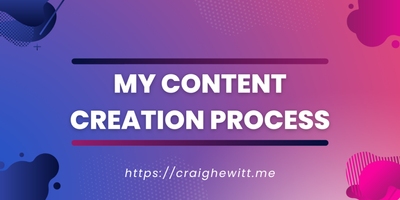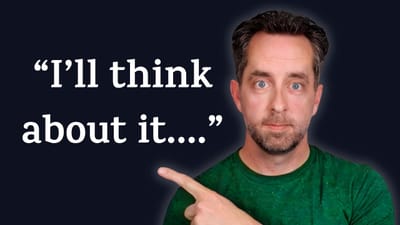
When I scaled my SaaS company, Castos, past the million-dollar mark, I faced a brutal reality: what got me here wouldn't get me there.
I was working 60+ hours weekly, involved in every decision, checking every Slack channel, and still feeling perpetually behind.
Sound familiar?
Here's what I didn't understand then but know with certainty now:
you can't scale a 7-figure business with a 6-figure mindset.
The transition from founder to CEO isn't just about delegation or hiring. It's a fundamental identity shift that requires rewiring how you think, what you prioritize, and how you lead.
And now I'd like to share the mindset shifts that transformed my own journey...and have since helped dozens of founders I coach to navigate this critical transition.
The Founder's Paradox
Here's the thing: The very qualities that make you an exceptional founder often become your biggest obstacles to growth.
As founders, we're scrappy, hands-on problem solvers. We're comfortable with chaos. We're the "figure it out" people who wear multiple hats and take pride in our ability to dive into the details. I certainly did.
I designed our first product, closed our first customers, wrote the initial marketing copy, and even handled support tickets. I did everything except write the code...yeah, you don't want me writing code.
That hands-on approach is critical in the early days. It's the only way to go if you're bootstrapping.
But at some point, usually around $20-40K MRR, something changes.
The business becomes too complex for one person to manage. You become the bottleneck, and in a cruel twist, your strengths become your weaknesses.
I learned this lesson the hard way. And now as a coach I see it over and over with dozens of different types of businesses, in different industries, serving different types of customers.
The more I tried to stay involved in everything, the more I constrained our growth.
My team couldn't move without my input. Decisions took too long. Quality suffered. And worst of all? I was exhausted and starting to resent the very business I'd worked so hard to build.
Your Job Is to Replace Yourself
I recently attended an Alex Hormozi Scaling Workshop. It was a great event, but the thing that stuck out to me most is:
The best founders view their businesses as investments. They're excellent Asset Allocators
This was a pretty big punch in the gut if I'm honest.
Instead of seeing my hands-on work as proof of my commitment, I needed to see my ability to build systems, allocate budget, and teams as my true contribution.
Think about it this way: If you're doing $300K in revenue and spending 60 hours a week working IN the business, what happens when you hit $1M? $3M? The math simply doesn't work. You don't have more hours to give.
The only solution is to transform your role from a doer to a leader, from an implementer to an architect. And ultimately just be the Owner.
Here are the mindset shifts that helped me make this transition:
1. From Tactical to Strategic Thinking
As a founder, you live in the day-to-day. As a CEO, you must live in the quarter-to-quarter and year-to-year.
This will be really hard at first, but it's an aspirational target. So treat it like that.
I used to spend my days responding to immediate needs - putting out fires, answering questions, making small improvements. As a result, I never had the mental space to think about where we were headed.
As a founder, a certain part of your week should be set aside just to think. To learn, to tinker. You're the only one who can do this early on, so guard this mental space.
Practically for me, the shift came when I blocked 4 hours every Friday for strategic thinking. No meetings, no Slack, no email. Just me, a few lattes at my favorite coffee shop, and big questions like:
- What's the biggest constraint on our growth right now?
- What key hires do we need to make in the next 6 months?
- How will the market change in the next year, and how should we position ourselves?
- What strategic partnerships could accelerate our growth?
- What don't I know right now that will hurt us in the next year?
These "thinking blocks" felt indulgent at first. With so much to do, how could I justify four hours of "just thinking"?
But they became the highest-leverage time in my week. A single insight from these sessions would cascade into dozens of improvements across the business.
CEO Mindset Shift: Your value comes from making the right decisions, not from making all the decisions.
2. From Doing to Designing
As a founder, you build the product. As a CEO, you build the company that builds the product.
This was perhaps the hardest transition for me. I loved being in the trenches, crafting product with the team, talking to customers, shooting YouTube videos.
It feels productive, tangible.
But as we scaled, I had to shift from doing the work to designing the systems that enable the work.
Instead of scoping out a feature, I needed to build a product process that let our team move quickly without sacrificing quality.
Instead of handling sales calls, I needed to create a repeatable sales playbook that anyone could follow.
Instead of managing the team day-to-day, I needed to establish clear OKRs and a meeting rhythm that ensured accountability without micromanagement.
This shift from doer to "architect" isn't easy.
It requires patience, systems thinking, and the humility to accept that others might execute differently than you would - and that's okay.
CEO Mindset Shift: Your product is no longer the software. Your product is the organization itself.
3. From Controlling to Empowering
As founders, we often fall into the trap of believing that control equals quality. If I review everything, nothing will slip through the cracks, right?
Wrong.
This approach creates a culture of permission-seeking rather than ownership. Your team becomes dependent on your input, moving slowly and cautiously.
I realized this when our lead developer said to me in a weekly 1-on-1, "I feel like I can't make any real decisions here."
This was a wake-up call. I had unintentionally created a culture where everyone waited for my approval.
And truth be told, I don't really have any exceptional skills in product, business, sales, or marketing. I'm just pretty good at all of them, and maybe better yet at seeing the whole picture.
So why don't I focus on where that skillset lies?!
The mindset shift came when I started seeing my role not as the decision-maker but as the decision-enabler. My job wasn't to make every call, but to ensure my team had:
- Clear direction (vision, strategy, priorities)
- Defined guardrails (principles, values, constraints)
- The information they needed (OKRs and metrics)
- The authority to act (giving permission to act based on values and strategy)
This shift required me to clearly define and communicate what good decisions look like in our company.
We created decision-making frameworks for different scenarios. For example, our product team now uses a scoring system to evaluate feature requests without needing my input on each one.
Was it scary? Absolutely. Did mistakes happen? Yes. But the increase in speed, team engagement, and ultimately growth was more than worth it.
CEO Mindset Shift: Your job is not to make every decision but to build a team that makes good decisions without you.
4. From Reactivity to Intentionality
As a founder, you're in constant reaction mode. A customer has an issue? You jump on it. A competitor launches a new feature? You scramble to respond. A team member has a question? You drop everything to answer.
This reactive mode is necessary in the early days but becomes crippling as you scale.
One of the most powerful shifts I made was moving from reactive to intentional leadership. This meant:
- Proactively communicating the vision and strategy so clearly that the team could make decisions aligned with our direction
- Creating processes for handling routine issues without my involvement
- Setting boundaries around my time and attention
- Prioritizing work that moved us toward our long-term goals, not just putting out today's fires
The practical implementation of this meant structuring my calendar differently. Instead of being available for impromptu meetings all day, I created specific office hours for the team.
To where now I have a weekly team meeting on Mondays, and then biweekly 1-on-1s with each team member....and that's it.
CEO Mindset Shift: Time is your scarcest resource. Protect it fiercely and invest it only where you can create unique value.
5. From Self-Reliance to Team Leverage
Perhaps the most fundamental mindset shift is from seeing yourself as the primary value creator to seeing your role as unlocking the potential of your team.
As founders, we often pride ourselves on self-reliance. We're the ones who get things done when no one else can. This identity can be hard to let go of.
I struggled with this until I realized a simple truth: even if I'm exceptional at something, my impact is limited to my own time and energy.
When delegating, if someone else on your team can do something at least 80% as good as you, it's a win.
This means:
- Hiring people better than you in specific domains
- Documenting your knowledge and approach
- Training and mentoring, even when it feels slower than doing it yourself
- Creating systems that scale your thinking
- Have a process in place for your team to report key metrics
- Celebrating team wins more than personal achievements
CEO Mindset Shift: Your effectiveness is no longer measured by your personal output but by your team's collective impact.
The Identity Shift: From Founder to CEO
These mindset shifts culminate in a fundamental identity change. You must see yourself differently to lead differently.
The founder identity is about building from scratch, proving the concept, doing whatever it takes. The CEO identity is about scale, sustainability, and strategic direction.
This transition isn't just intellectual - it's emotional.
There's a sort of grief in letting go of the founder role that brought you initial success. There's fear in delegating work that you know how to do well. There's uncertainty in taking on responsibilities that may be new to you.
This identity shift doesn't happen overnight. It's a gradual process of letting go of old patterns and embracing new ones. But it's essential for growth beyond the early stages.
This Isn't About Working Less - It's About Scaling Impact
I want to be clear: The founder-to-CEO transition isn't about checking out or taking it easy. In many ways, the challenges become more complex, the decisions more consequential.
This is about increasing your leverage, ensuring that every hour you invest creates the maximum possible impact on your business's growth and success.
It's about building a company that can thrive beyond your personal bandwidth, that can grow to its full potential rather than being constrained by a single person's capacity.
The journey from founder to CEO is ultimately about evolution - your company has evolved, and now you must evolve with it.
If you're at that inflection point where what got you here won't get you there, I'd love to help. My coaching program is designed specifically for founders at the $20K+/mo stage who are navigating this crucial transition to $3M ARR and beyond.
Because I've been there, and I can tell you that on the other side of this identity shift is a level of business growth and personal fulfillment that makes all the growing pains worthwhile.
What founder-to-CEO mindset shift are you currently struggling with? I'd love to hear from you in the comments or via email.
The Sales Sprint helps you install the playbooks, messaging, and systems to drive real pipeline and close bigger deals, faster.


